Two years of Covid: the view from inside schools
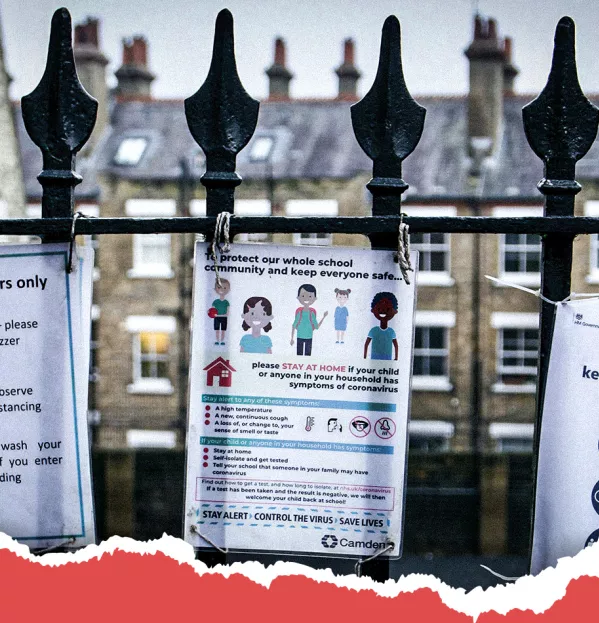
Monday 23 March 2020 should have been a normal day for schools around Scotland. Instead, all was quiet.
The previous 10 days had seen an extraordinary sequence of events. Student-teacher placements were cut short and school inspections were suspended indefinitely. At any other time that would have been headline news, but, as Covid took hold, these weren’t even the biggest education stories in town for very long.
Within the space of a tumultuous couple of days, national exams had been cancelled for the first time in their history - they had carried on through both world wars - and schools were ordered to shut their doors en masse, for how long nobody knew.
Since then, as Tes Scotland has documented over the course of around 1,000 articles, the impact on Scottish education has been monumental, although it is still too early to gauge exactly what the legacy will be.
Listen to the accompanying Tes Scotland podcast episode here:
But how did all the upheaval feel to those working in and around schools? How did their day-to-day lives change, what was the impact on pupils and - whenever the dust finally does settle - will Scottish education emerge transformed?
Henry Hepburn and Emma Seith spoke at length to 10 educators who reflected on their experience of two years of Covid and what happens next.
Perhaps it can all be summed up by secondary head Johnny Lothian, who said that, after getting through the turmoil and trauma of a global pandemic, the country’s teachers should not feel overly intimidated about any challenge they face in the future.
Our interviewees
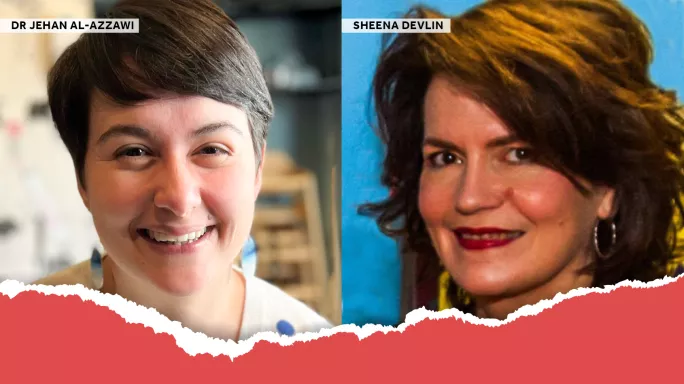
Dr Jehan Al-Azzawi, a recently qualified primary teacher in Falkirk
Sheena Devlin, director of education and children’s services, Perth and Kinross
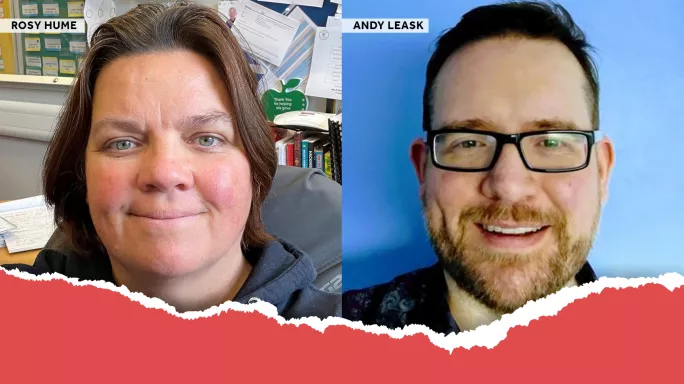
Rosy Hume, headteacher at a special primary school in Edinburgh
Andy Leask, head of e-learning at St George’s School for Girls, Edinburgh, and formerly head of English and drama
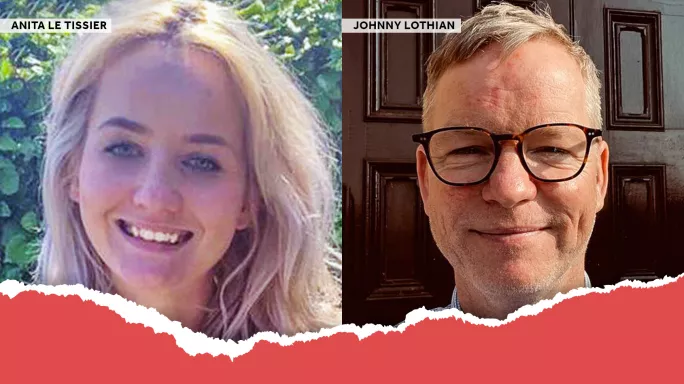
Anita Le Tissier, early years educator and depute head at a primary school in Edinburgh, and co-founder of Scottish Educators Connect
Johnny Lothian, headteacher at Morgan Academy, Dundee, who took up the post in January 2021 during the second lockdown and was previously head at Perth Academy
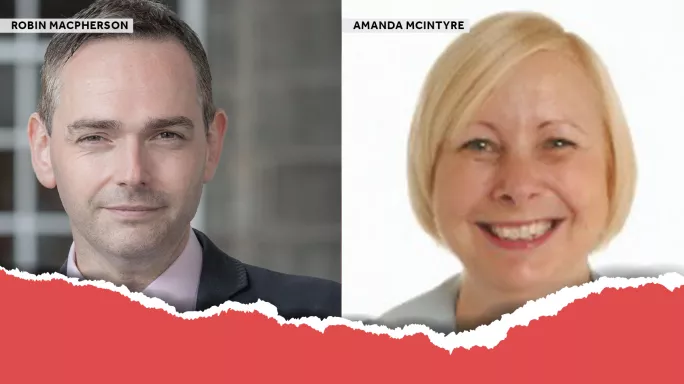
Robin Macpherson, headteacher at Robert Gordon’s College, Aberdeen, and co-author of The Teaching Life: professional learning and career progression
Amanda McIntyre, a primary head in Perth who, with her husband Grant, co-wrote the book Dying to Live: the remarkable story of Scotland’s sickest survivor of Covid-19

Rachel Richards, principal teacher of design, technology and home economics at Kingussie High School, Highland
Nuzhat Uthmani, a primary teacher in Glasgow and co-founder of the support and activism group Scottish Teachers for Positive Change and Wellbeing
Extremes of work-life balance
Just four days before Amanda McIntyre took up her first headteacher job in August 2020, her husband, Grant - who became known as the sickest Covid patient in Scotland to survive - was discharged from hospital after months in intensive care.
There was “a lot of concern” and it was “very difficult”, says McIntyre. Measures had to be put in place to make sure Grant - a consultant and professor of orthodontics at Dundee Dental Research Hospital and School - was supported during the day. But she says “the thrill of taking up post…really buoyed me along”.
“School is a really full-on environment in which to work - if you wanted the perfect distraction, then the school environment is it.”
Grant is now back at work full time and although he has long Covid symptoms, he has “astounded most of the medics who worked with him, in terms of his recovery”.
When the first lockdown hit, Johnny Lothian found himself running Perth Academy from his living room and home-educating his four children - two in primary and two in secondary - while his wife, an NHS HR manager, was redeployed to fit face masks for frontline workers.
Lothian is careful to point out that plenty of people had it much worse but, nonetheless, it was “hugely challenging” and “unlike anything I have experienced before or since”. The key to successful home learning - and to keeping Perth Academy running - was, he found, establishing “routine and predictability” wherever possible.
In the second lockdown, Lothian found himself having to apply those principles in a new school, after he became head at Dundee’s Morgan Academy in January 2021.
Jehan Al-Azzawi decided to become a teacher after she was widowed with a small child. When schools closed in March 2020 she was nearing the end of her final placement. She looked after her daughter, Aya - who at that time was 4 - during the day and then did her university work after Aya’s bedtime. She felt isolated but it was manageable. The second lockdown was in her probationary year, and then the workload really started to bite.
She was relieved that she got to know her P7 class before school buildings closed in January 2021, but her low point came with the “quadrupled workload that remote learning entailed”.
Al-Azzawi wasn’t required to do live lessons but she recorded videos and audio for her class, which, even though she is “quite digitally literate”, would take “ages to prepare”.
But at least the colossal efforts of teachers were recognised - that was not the case for all education staff, says Anita Le Tissier.
“Early-years practitioners are the backbone of every single nursery setting, and they were not praised through the pandemic nearly half as much as teachers were,” she says.
Rosy Hume says life was also hard for those who found that their work suddenly dried up during lockdown: “You have a lot of support staff in a special school who wouldn’t normally be doing the online learning, who felt there was no purpose for them.”
Covid’s shifting sands
The date 23 June 2020 is ingrained in Sheena Devlin’s memory. It was then that former education secretary John Swinney suddenly announced schools would be returning full-time in August - there was no requirement for blended learning after all.
Councils’ blended learning plans had been “pilloried” in the media after it emerged that children might only be in school buildings for a couple of days a week, Devlin remembers. But putting those plans together had been “really hard work” and then, with no warning, right at the end of the school year, they were scrapped.
But there’s another reason why 23 June 2020 sticks in Devlin’s mind. It was also her mum’s 80th birthday and she was responsible for bringing the cake to the family party. So, while she hurriedly contacted colleagues to figure out the implications of the dramatic Covid policy change, she was conscious that she (and the cake) were due at her brother’s garden in Dundee.
And there was something else: before she could go anywhere, she had to pack her partner’s open wound. He was treated for bowel cancer during the first lockdown and had gone through major surgery.
After a rapid pitstop at home she was finally ready to go, and then - in the sort of incident familiar to anyone forced to spin multiple plates during Covid - Devlin dropped her mobile phone down the toilet.
“[My partner] obviously can’t come [to the party] because he’s shielding and I’ve got the bloody birthday cake. My phone is now kaput but I’ve put it in a bag of rice in the vain hope that I can dry it out. And I know that I’m coming back from the short time I can spend at my mother’s 80th to then think about what I will say to the elected members the next day - and then to begin replanning for a completely different start.”
Devlin recalls that day as “one of my lowest points”.
“That night I wrote to every one of our headteachers and just thanked them for everything they had done - so they knew it wasn’t wasted, that I valued it.”
Other teachers and heads also recall the uncertainty and constantly shifting sands of the pandemic with little fondness.
Andy Leask’s low point came during the second national lockdown and was prompted by all the uncertainty around assessment - such as how on earth it was going to be possible to gather evidence for grades when pupils were not in school.
For certain subjects, it has been “really difficult” to source materials needed for classes - especially in a rural area, says home economics teacher Rachel Richards. Uncertainty over what ingredients will arrive has persuaded her to try new approaches.
“I’m trying to source things locally, so I’m using a lot of game when it’s in season from our local estates - they are quite happy to send in pheasants and partridges. I’m incorporating that more and more into the curriculum.”
As so often in times of crisis, mordant humour helped people through. Johnny Lothian remembers phoning a radio request programme and asking for the Orange Juice song Rip it Up (“Rip it up and start again,” goes the chorus) after intensively working on a timetable with two other members of staff, only for the government’s plans to change.
But there was little time for school staff to think or feel sorry for themselves, and the response at Lothian’s school was replicated across the country: “We just laughed and got on with it.”
The digital revolution
Andy Leask became e-learning coordinator at his school in August 2019. “I bet when you signed up for this job you weren’t expecting this” became the running joke of the first lockdown - when he was supporting colleagues as they got to grips with digital learning. He has never worked harder but it was “so rewarding”, watching teachers “just roll with it and get on board”.
That initial period was “intense but it was also surprisingly positive because everybody rose to the challenge”, says Leask, who was “very proud of my colleagues and the profession as a whole for how we responded”.
Amanda McIntyre also highlights the “massive increase” in teachers’ ability to use technology for learning - teachers are now “less worried and cautious” about using digital tools. Rachel Richards says her ICT skills “were pretty good anyway” but because of the move to online learning they “improved 1,000 per cent”.
But in secondary, Leask - now head of e-learning at his school - sees a disconnect between end-of-year handwritten exams and the Covid-fuelled digital revolution in the classroom. “There are more interesting and creative ways to assess how well students know things,” he says.
In Glasgow, where Covid accelerated a plan that was already in place to give tens of thousands of pupils iPads, primary teacher Nuzhat Uthmani says her approach to homework has changed.
“I don’t have physical homework: everything gets uploaded, and the children are able to use our kind of online platform to share their homework and go there for feedback.”
Uthmani now “hardly ever” uses a printer and her classwork is getting close to paperless - and the jotter, that centuries-long staple of Scottish schools, might be on its way out.
“I don’t mark jotters a lot of the time - it’s a matter of, ‘I’ll upload that and get back to you.’ Children like that, they engage better with that.”
While the pandemic led to a huge improvement in teachers’ skills, it has also highlighted the limitations of digital learning, says Jehan Al-Azzawi.
The pandemic confirmed to her that “remote learning can never replace face-to-face teaching and learning” and that “relationships are foundational to educational success”.
Camaraderie and collaboration
“Teaching is a collaborative endeavour,” says Al-Azzawi. But as someone who during Covid has been a student teacher, then a probationer, and is now in her first year as a fully-fledged teacher, she has seen all sorts of opportunities for collaboration curtailed by the pandemic.
The first lockdown put a stop to meeting fellow teaching students in person to share ideas. Then, during her probation, although she was “very well supported”, she was unable to observe more experienced colleagues, given Covid rules around mixing.
“Teaching is a collaborative endeavour…we all have different strengths and different interests that we pursue in the classroom, so the more opportunity we have to share, the better,” she says. But she found such interactions “really quite limited” by Covid.
However, other teachers say the pandemic strengthened the bonds between them, even if they could not meet in person.
For Rachel Richards, it is one of the silver linings of Covid: “The camaraderie we have developed among teachers and the sharing of resources has been the best thing to come out of this.”
This is echoed by special school head Rosy Hume, who says the pandemic has led to more partnership working because “people have really needed each other”. And primary teacher Nuzhat Uthmani, similarly, says the enormity of the challenge that the profession faced with the mass move to online working brought teachers together in grassroots groups and forums - she co-founded one herself during Covid, Scottish Teachers for Positive Change and Wellbeing, which now has around 3,200 members.
Sheena Devlin says that Scotland’s education directors (who come together in the national body ADES) started having a weekly meeting on Zoom, where they were sometimes joined by colleagues from the Scottish government, Education Scotland or Public Health Scotland. Previously, the ADES directors’ forum met only four times a year. The meetings - which now take place fortnightly - are “a tremendous way of communicating information” and have led to more informal support among directors.
Devlin questions if she will ever again be getting in a car and driving to Edinburgh for a shortish in-person meeting - something she and her colleagues did on 11 March 2020, but never since. Face-to-face is sometimes better but she hopes that the “machismo of presenteeism culture” is gone for good.
Robin Macpherson is looking forward to regaining that “communal feeling” that will come with staffrooms and staff meetings returning to something like they were pre-Covid - but hopes that long treks to disappointing conferences will be a thing of the past.
The power of fun and laughter
We need to get children “happy in school and ready to learn” and if we do that, “the attainment will come”, says Rosy Hume. She believes the waterslide she bought during the second lockdown, when special schools like hers stayed open, was “the best £60 I’ve ever spent in my life”.
“The kids just got to let go and so did the staff - doing fun things in a time when I think fun had kind of been forgotten about,” says Hume.
Andy Leask pinpoints the second national lockdown as his low point, but the humour of his Higher English class got him through - from the elaborate accessories that one pupil wore to every Microsoft Teams lesson, to the time they all set a photo of him as their background. “It was terrific because it lifted the mood of every single student - and me.”
Robin Macpherson was reminded of one of “the joys of being in school” when, last September, he got to listen to children singing in the same room for the first time in a year and a half as they performed the hymn I Vow to Thee, My Country - singing had been banned over fears it could help spread Covid. It was “such a simple thing” to hear the school’s junior choir rehearse but “a really emotional, intense experience”.
Widening inequality and lost learning
There were plenty of predictions that the most vulnerable would be hardest hit by Covid, but now teachers are seeing that happen before their eyes.
“We’re kind of picking up a year and a half behind in terms of routine and supporting families,” says Anita Le Tissier. Vulnerable families have become “much less resilient at coping”; they could not access services such as sleep training, speech and language therapy, and behavioural support from the health visitor team, because “all of that stopped” - as did the unplanned, informal chats with nursery staff that proved so valuable to many young parents.
“Sometimes you do wonder: is there going to be a really long-term impact?” says Le Tissier.
Teachers often became annoyed by reports that schools were “closed” during lockdown periods, given all the hubs established in schools and nurseries. But some vulnerable children did not get to use those hubs, says Le Tissier - they might have had to be on the child protection register or officially designated as looked after, for example, otherwise they could miss out.
Now, she says, there are some children who may need specialist provision going into P1 who would not have needed it pre-Covid. “I think that is more common than the government and local authorities would like to admit - interventions for vulnerable families didn’t happen quite as well as they said it did.”
Amanda McIntyre says safeguarding was “probably one of the big challenges” during the lockdowns - not seeing a child at close quarters in school to gauge how they were doing made it far harder - and “caused a lot of staff a lot of worry and concern”.
She believes Covid has hit Primary 3s the hardest: children who have never had a school year unaffected by Covid. Primary 1 is a year when “I always feel you absolutely have to get right” in terms of their education and their social and emotional development - so it is “reasonable to assume” that those children have been “quite significantly affected” by two years of Covid.
Rachel Richards is concerned about S4-5s, now approaching crucial points in their lives without the experience of school that they should have had under their belt. They lack certain practical skills and find “socialising and being in a classroom environment much harder”. Many also appear to lack a sense of urgency about coursework deadlines - “trying to chivvy them along is incredibly difficult”. Staff are also trying to help students who have had to isolate multiple times, which has left them “on this permanent catch-up”.
Johnny Lothian warns that we need to “understand the impact [of the pandemic] on young people”. The symptoms are clear: attendance is down and young people are reporting more mental health problems. He hopes that next year schools will have “more headspace” to be “really proactive about what these kids need”.
Robin Macpherson sounds a positive note about the ultimate impact of Covid on pupils around the country - he has “a funny feeling that they’ll do a lot better than we perhaps expect” and says “they’ve been a lot tougher than we’ve given them credit for”.
“They’ll be different, no doubt about that, but they won’t necessarily be weaker or less well set up for later life - you might even see a generation that’s more willing to grasp opportunity because they’ve been denied it at a crucial stage of development in their life.”
Exams and assessment
Tes Scotland has written at length about the exam (or non-exam) debacles of 2020 and 2021 - the jury is still out on 2022 - which were a catalyst for change to national education bodies. On 9 March 2022, the Muir report on reform of the Scottish Qualifications Authority (SQA) and Education Scotland was published, but scepticism remains about how significant that change will be.
“My worry is the SQA isn’t really looking to change substantially,” says Robin Macpherson. “I think it’s going to be a bit like Facebook and Meta: a different name, but the same people and probably the same processes - more of a rebranding.”
At the start of the pandemic, after the historic decision to cancel the 2020 SQA exams, there was much excitement about truly radical reform of assessment - perhaps even the end of exams.
That has largely died away, and Macpherson says Scotland should “preserve what was good about the old system because it’s not terrible - don’t throw out the baby with the bathwater”.
“There’s still something to be said for having a body of knowledge, schematic knowledge, and being able to perform under pressure in a high-stakes assessment,” he says, because life after school will present similar high-pressure situations.
But he notes that the work of University of Glasgow researcher Barry Black - a prolific commentator on assessment matters during Covid - underlined how “inexorable” assessment can be in Scotland, and the need for a “greater variety of assessment” that finally, post-Covid, helps Scotland consign to history the notorious “two-term dash” to Highers in S5.
The resistance to change of the widely unloved Scottish National Standardised Assessments (SNSAs), however, shows that even an epochal pandemic may not be the catalyst for change many hoped for. And Rosy Hume, like many school leaders in Scotland, has been critical of the notion of “catching up” with learning disrupted by Covid, which they see as implicitly - and wrongheadedly - focusing on attainment ahead of wellbeing.
Yet, Hume says, “if you get [pupils] happy in school and ready to learn, the attainment will come on”. To make attainment the overriding priority is, she believes, “missing a trick.”
Transitions
Before Covid, this generation of schools and nurseries had grown accustomed to providing a wide range of activities and support around the move up to primary or secondary school. That was, of course, largely built around actual visits to the school, which were now no longer possible.
Amanda McIntyre says that transition has been “a big challenge” of Covid. “It’s a big ask of the children, particularly those coming up into the primary school when they’ve never actually had their foot in the door, to be left at the door by a parent.”
Schools tried to organise “all the things you would normally do”, says McIntyre: virtual tours were arranged for P7s and new P1s, as were opportunities to hear stories, have chats with teachers and experience the dining hall (without the actual food or sensory overload of walking into a secondary school’s canteen, of course).
It gave pupils “some kind of understanding of what would happen when they came into the school” and made it “that little bit more predictable for them”.
Anita Le Tissier was delighted to see that the children she already knew from nursery quickly got back into the swing of things when they returned in August 2020. “They were so cuddly and happy,” she recalls. “They skipped in - it was like they were desperate to be around other children and to play again, and it was just lovely.”
It was a different story, however, for children starting nursery during Covid, most of whom would have been aged just 1 when the pandemic first hit Scotland.
“They were just babies - and what we find now is that these children are not resilient,” says Le Tissier. “They haven’t had the same exposure to other children…the same opportunities to interact with other children, to learn to negotiate and to be around as many other adults. Navigating things like lunchtime, cafés and sharing the garden outside is all new.”
These children struggle to “stay calm when things aren’t going their way, to find strategies to cope with new situations”. Their difficulties after all the disruption of Covid underline just how important good transition processes are.
Professional learning
“Professional learning has been very different - in a good way,” says Robin Macpherson, who has plenty of experience of knowing what it is like to organise it - including being content director of the Telegraph Festival of Education and organiser of researchED Scotland events.
“So much good-quality stuff went online, which meant people again didn’t have to travel to conferences, and you didn’t have to be in London to see the best stuff - and a lot of that was free,” he says. “The very big providers who were charging a hell of a lot of money, I think found it a bit more difficult…so it became a very different marketplace”.
At times, professional learning opportunities during Covid have felt somewhat chaotic - “a little bit like an all-you-can-eat buffet,” says Macpherson, where the seductive waft of myriad options could lead you to “overindulge and not necessarily eat the best stuff”.
A do-it-yourself approach to professional learning has flourished during Covid. Anita Le Tissier and her friend James Cook, a Highland primary headteacher, started Scottish Educators Connect, for example. The strength of connections and richness of conversation saw what was initially a lockdown book club turn into something broader - a hub of what its organisers describe as “grassroots professional learning”.
The teachers we spoke to saw enough innovation to convince them that better opportunities for professional learning may be available in the post-Covid era - and that trudging along to in-person conferences should no longer be the default for teachers.
You need a Tes subscription to read this article
Subscribe now to read this article and get other subscriber-only content:
- Unlimited access to all Tes magazine content
- Exclusive subscriber-only stories
- Award-winning email newsletters
Already a subscriber? Log in
You need a subscription to read this article
Subscribe now to read this article and get other subscriber-only content, including:
- Unlimited access to all Tes magazine content
- Exclusive subscriber-only stories
- Award-winning email newsletters
topics in this article



